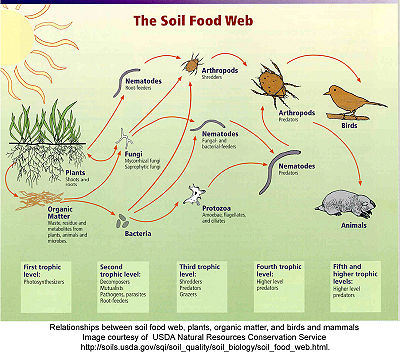Mulch Is Critical To The Success Of Any Vegetable Garden - No Exceptions!!!
Organic mulch in the vegetable garden is not an option. It is essential the success of that garden. Gardening books for 40 years have missed the point. They reported that the value of organic mulch was:
1. To keep weeds down
2. To slow down the evaporation of water from the soil
3. To cool the soil in the heat of summer
Now mulch performs those hree functions, however there are two more that are much more important:
4. To created a habitat for beneficial insects including ants, spiders, and ground beetles
5. TO PROVIDE FOOD TO THE SOIL FOOD WEB! That is why we need to have mulch on the vegetable garden 365 days year.
Types Of Organic Mulch For A Vegetable Garden
If you have lots of trees on your property, then you have a source of organic mulch - chopped leaves. You need to put the leaves through a mulching mower or a shredder because unshredded leaves are not appropriate. They bunch up, do not offer habitat to beneficial insects, and most important are not bite sized for earthworms to take down to the soil food web.
If you have no leaves, then straw is the best material for mulching a vegetable garden.
In either case, you want to keep a layer of organic mulch on the garden that never gets thinner than two inches. Start off with 3 to 4 inches; 4 inches in the fall when the season is over.
What Is The Soil Food Web? and Why Do They Need Mulch?
A healthy soil, a soil not messed up by humans, has billions and billions of creatures below the surface down to about 12 inches deep. The big guys include earthworms, millipedes, centipedes, sow bugs, earwigs, and springtails to name a few. The little guys are microscopic and include beneficial bacteria, fungi, potozoa, and lots of others. In one tablespoon of healthy soil there will be a billion microbes; yes, a billion! In lousy soil, there will likely be only 10% of that number.
It is the creatures making up the soil food web that decompose organic matter and turn it into chemicals that plants can use as food. In a very healthy soil there is no need to fertilize. The organic mulch pulled down into the soil becomes that food for the plants.
Mulch is lunch for the soil food web. No mulch, not much of a soil food web. That means having to fertilize you garden several times a year; every year.
Here is a picture of the soil food web:


